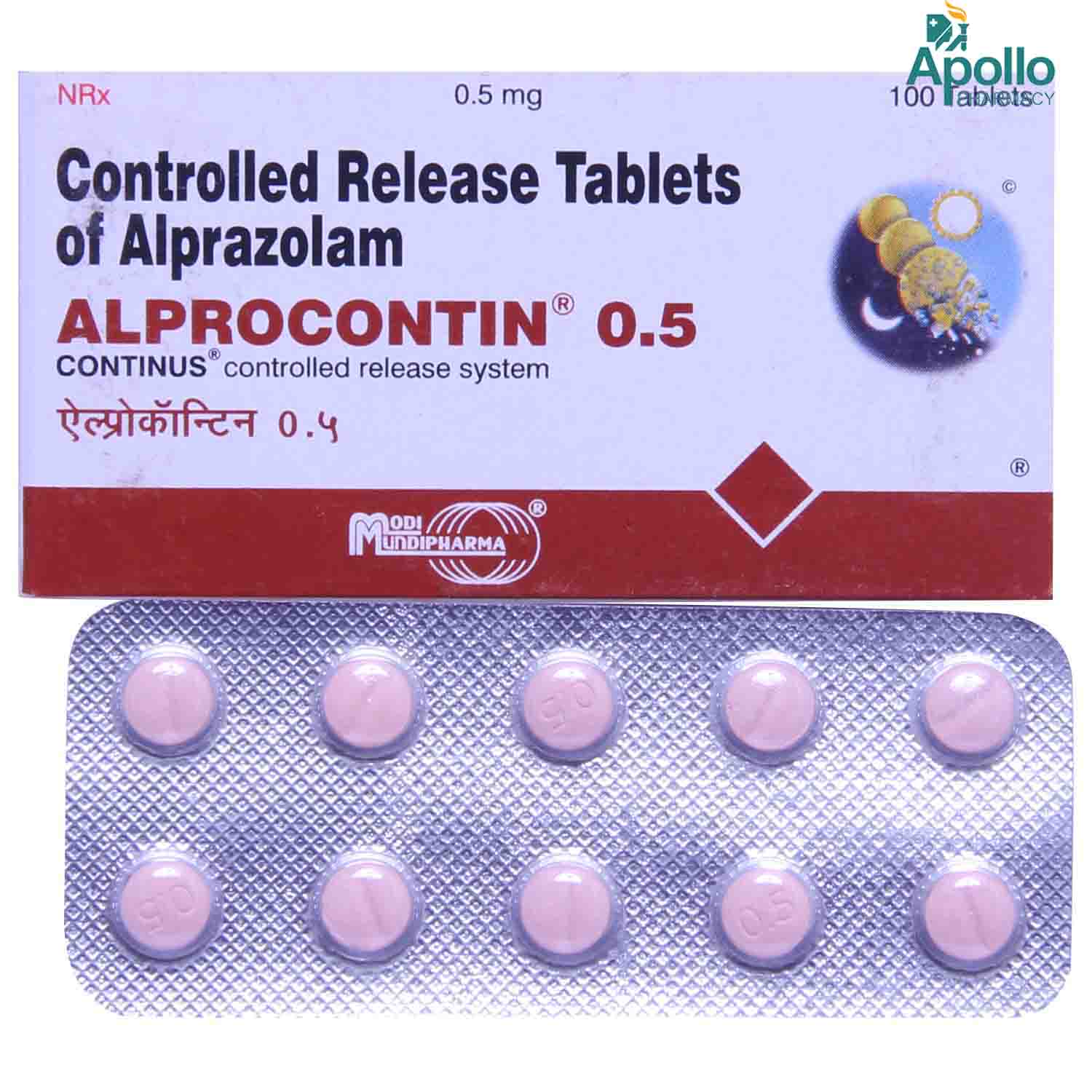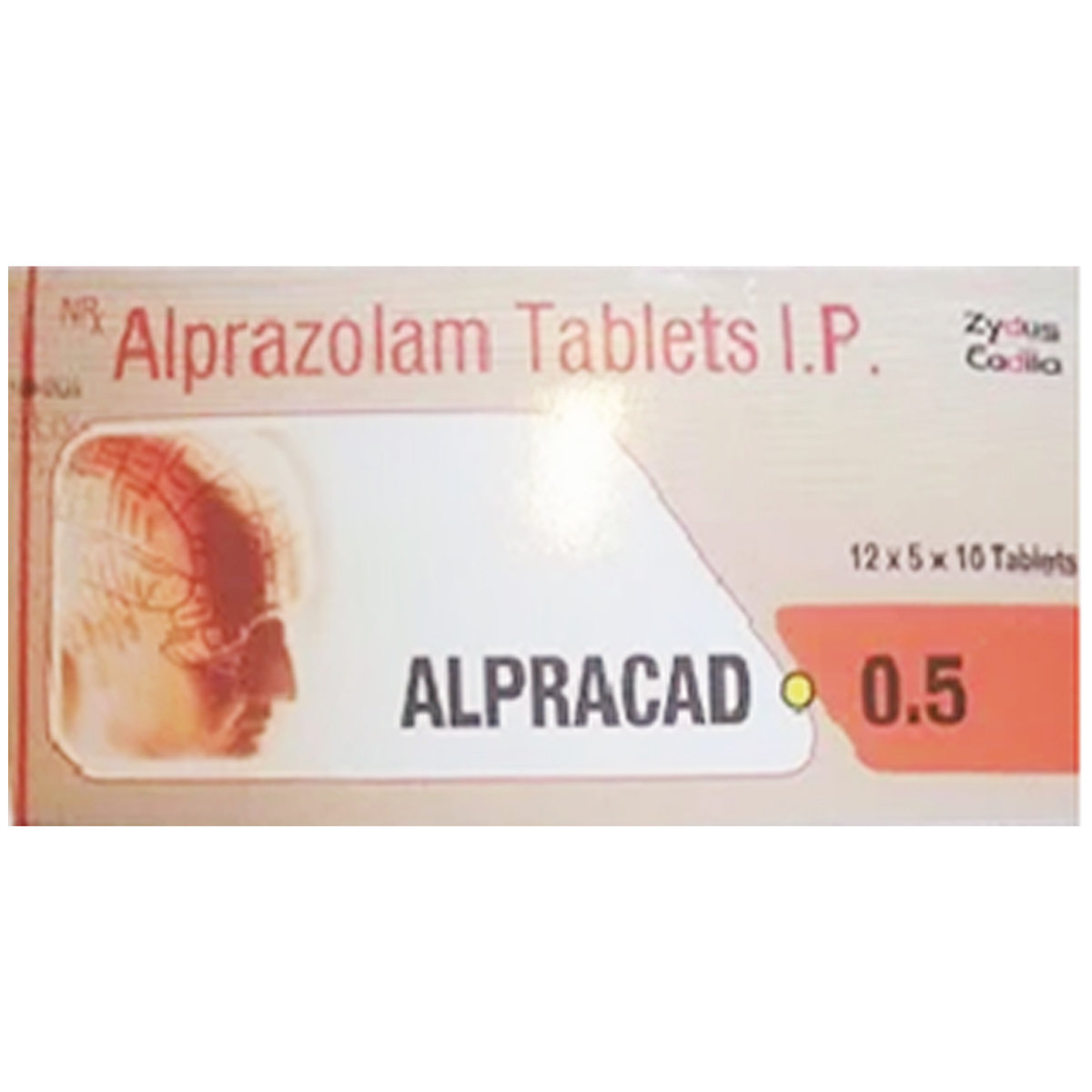Alprazolam
About Alprazolam
Alprazolam is used to treat severe anxiety over a short period and panic disorder with or without agoraphobia (an anxiety disorder that makes people very fearful of certain places and situations). Anxiety is a mental health disorder associated with fear of worry and excessive nervousness. On the other hand, panic disorder is a type of anxiety disorder that causes sudden feelings of fear even when there is no real danger, with symptoms like a fast heartbeat.
Alprazolam reduces anxiety/panic by decreasing abnormal and excessive excitement of nerve cells in the brain. It works by increasing the activity of GABA ( a chemical messenger in the brain that acts as a natural nerve-calming agent). Thereby, Alprazolam relaxes muscles, reduces anxiety, produces a feeling of calm, and helps to fall asleep.
Take Alprazolam with or without food and swallow whole with a glass of water. Your doctor will advise you on how often you take Alprazolam based on your medical condition. Some people may experience depression, sleepiness and drowsiness, jerky, uncoordinated movements, inability to remember bits of information, slurred speech, dizziness, light-headedness, headaches, constipation, dry mouth, tiredness, and irritability. Most of these side effects of Alprazolam do not require do not require medical attention and gradually resolve over time. However, if the side effects persist or worsen, please consult your doctor.
If you are known to be allergic to Alprazolam or any other medicines, please tell your doctor. Alprazolam is not recommended for children below 18 years of age. Do not take Alprazolam if you are pregnant or breastfeeding, as it may cause adverse effects on the baby. Inform your doctor if you have a drug addiction, muscle weakness, chronic pulmonary insufficiency, liver or kidney problem, or narrow-angle glaucoma (damage to optic nerve) before taking the Alprazolam. Do not take Alprazolam with opioids as it may cause breathing problems or other severe adverse effects.
Uses of Alprazolam
• Anxiety Management: Alprazolam helps to alleviate anxiety symptoms, such as excessive worry and tension, providing relief for individuals with anxiety disorders.
• Panic Disorder Treatment: Alprazolam helps treat panic disorders by reducing the frequency and intensity of panic attacks.
• Sleep Aid: Alprazolam is sometimes used to help with sleep disturbances, particularly for anxiety-related insomnia, helping individuals fall asleep and stay asleep, especially in the initial stages of treatment.
• Muscle Relaxation: Alprazolam can also be involved in relaxing muscles and relieving tension, providing relief for stress-related physical symptoms.
• Sedation: Alprazolam can be used for sedation during medical procedures or before surgeries by helping to calm patients and reduce anxiety.
Medicinal Benefits
Alprazolam is an anxiolytic drug (anxiety reducer) that is used to treat anxiety, and panic disorder over a short period. Alprazolam increases the activity of GABA (a chemical messenger in the brain that acts as a natural nerve-calming agent) and is involved in inducing sleep. Thereby, Alprazolam relaxes muscles, reduces anxiety, and induces sleep. Alprazolam is not to be used for mild anxiety associated with the stress of today's life situations.
Directions for Use
- Alprazolam can be taken with or without food as advised by your doctor.
- Follow your doctor's instructions on the dosage and timing of this medication.
- Swallow Alprazolam as a whole with a glass of water.
- Do not crush, break, or chew it.
Storage
Side Effects of Alprazolam
- Depression
- Sleepiness
- Drowsiness
- Jerky
- Uncoordinated movements
- Inability to remember bits of information
- Slurred speech
- Dizziness
- Light-headedness
- Headaches
- Constipation
- Dry mouth
- Tiredness
- Irritability
- Loss of appetite
- Confusion and disorientation
- Increased sex drive (men and women)
- Erectile dysfunction
- Nervousness or feeling anxious or agitated
- Insomnia (inability to sleep or disturbed sleep)
- Problems with balance
- Unsteadiness (similar to feeling drunk), especially during the day
- Loss of alertness or concentration
- Inability to stay awake
- Feeling sluggish
- Shakiness or trembling
- Double or blurred vision
- Feeling sick
- Skin reactions
- Change in your weight
Drug Warnings
Do not take Alprazolam if you are known to be allergic to Alprazolam. Alprazolam is not recommended for below 18 years of age. Do not take Alprazolam if you are pregnant or breastfeeding as it may cause adverse effects in the baby. Alprazolam should be used with caution in elderly patients as there is an increased risk of adverse reactions such as drowsiness, dizziness, and muscle weakness. Inform your doctor if you have myasthenia gravis (muscle weakness), drug addiction, chronic pulmonary insufficiency, narrow-angle glaucoma, kidney/liver problem before taking Alprazolam. Do not take Alprazolam with opioids as it may cause breathing problems, drowsiness, and coma.
Drug Interactions
Drug-Drug Interactions: Alprazolam may have interacted with any other medicines to treat anxiety or depression or to help you sleep (nefazodone, fluvoxamine, fluoxetine), pain killers (morphine, codeine, dihydrocodeine, buprenorphine), antihistamines/antiallergics (chlorphenamine, diphenhydramine, promethazine), antifungal (fluconazole), oral contraceptives (the pill), certain antibiotics (erythromycin), medicines used for treating stomach ulcers (cimetidine), drugs used for angina and high blood pressure (diltiazem), medications used to treat various heart conditions (digoxin), drugs used for treating HIV (ritonavir), antipsychotic medications used to treat mental illnesses like schizophrenia, and medicines to treat epilepsy.
Drug-Food Interactions: Alprazolam may interact with alcohol. Therefore, avoid consuming alcohol while taking Alprazolam as it may increase side effects such as drowsiness, dizziness, or difficulty in concentrating.
Drug-Disease Interactions: If you have narrow-angle glaucoma, myasthenia gravis(muscle weakness), pulmonary insufficiency, or kidney/liver problems, inform your doctor before taking Alprazolam.
Drug-Drug Interactions Checker List:
Safety Advice

Alcohol
unsafeAvoid consumption of alcohol with Alprazolam as it may increase the risk of drowsiness and other adverse effects.

Pregnancy
unsafeAlprazolam is a category D pregnancy drug. It is not recommended for use during pregnancy, especially in the second and third trimesters as it may cause harm to the unborn baby.

Breast Feeding
unsafeAvoid breastfeeding while taking Alprazolam as it may be excreted in breast milk and cause adverse effects in the baby.

Driving
unsafeAlprazolam may cause dizziness, double vision, or drowsiness in some people. It is an offence to drive if Alprazolam affects you. Therefore, avoid driving if you feel drowsy, dizzy, or experience any vision problems after taking Alprazolam.

Liver
cautionTake Alprazolam with caution, especially if you have or had a history of liver diseases/conditions. The dose may be adjusted by your doctor as required.

Kidney
cautionTake Alprazolam with caution, especially if you have or had a history of kidney diseases/conditions. The dose may be adjusted by your doctor as required.

Children
cautionAlprazolam should not be used by children, as the efficacy and safety have not established.
Habit Forming
Diet & Lifestyle Advise
- Follow a regular sleep pattern. Do not take a nap during day time.
- Avoid watching Tv, using mobiles or laptops just before bedtime.
- Maintain a diet rich in fruits, vegetables, and whole grains. Avoid fried foods, high-fat dairy products, pastries, and processed foods as they may worsen anxiety.
- Do regular exercise and maintain healthy body weight.
- Avoid consumption of alcohol as it may increase drowsiness.
Special Advise
Do not take Alprazolam for a prolonged time as it may lead to mental or physical dependence on Alprazolam.
Patients Concern
Disease/Condition Glossary
Anxiety disorder: It is a mental health disorder associated with fear, worry, and excessive nervousness that may interfere with one's daily activities. The symptoms of anxiety include feeling more stress than required for that event and a lack of ability to set aside restlessness and worry.
Panic disorder: It is a mental disorder where people have feelings of anxiety, stress, and panic or fear regularly and at any time, often for no apparent reason. During a panic attack, you get a rush of intense mental and physical symptoms. It can come on very quickly and for no apparent reason. A panic attack can be very frightening and distressing.
FAQs
Alprazolam is used to treat severe anxiety over a short period and panic disorder with or without agoraphobia (an anxiety disorder that makes people very fearful of certain places and situations).
Alprazolam reduces anxiety/panic by decreasing abnormal and excessive excitement of nerve cells in the brain. It works by increasing the activity of GABA ( a chemical messenger in the brain that acts as a natural nerve-calming agent). Thereby, Alprazolam relaxes muscles, reduces anxiety, produces a feeling of calm, and helps to fall asleep.
No, Alprazolam is not indicated for the treatment of heart palpitations. However, it may help in reducing heart palpitation associated with anxiety. Alprazolam should always be taken only when advised by your doctor.
Yes, Alprazolam may cause mental or physical dependence if used for a prolonged time. Therefore, take Alprazolam only in dose and duration as advised by your doctor.
No, Alprazolam is not used for the treatment of any pain. It is used for the treatment of anxiety.
No, you are not recommended to take Alprazolam with codeine as co-administration of these medicines may cause breathing problems, drowsiness, and coma. However, before using Alprazolam with codeine and any other opioids, you are advised to contact your doctor so that the dosage may be adjusted accordingly to use safely.
Alprazolam is generally safe when used as prescribed by a doctor. However, it has a high potential for habit forming and should be used with caution. Do not exceed the recommended dose.
No, Alprazolam is not an opioid. It belongs to the class of medications called benzodiazepines.
No, Alprazolam is not an antidepressant. It is used to treat anxiety.
No, Alprazolam is not a narcotic substance. It belongs to the class of medications called benzodiazepines.
No, Alprazolam is not used to manage hangover. Taking Alprazolam with alcohol can cause excessive sedation and depress your brain.
Yes, Alprazolam is used to treat severe anxiety over a short period and panic disorder with or without agoraphobia (an anxiety disorder that makes people very fearful of certain places and situations). It is not recommended for mild anxiety caused by stress of day to day life situations.
Alprazolam overdose may cause low blood pressure. Thus, do not exceed recommended doses. However, if you experience severe low blood pressure while taking Alprazolam, consult your doctor.
Yes, Alprazolam can cause sleepiness as a side effect. This usually reduces over time and doesn’t require medical attention. If it persists or worsens, please consult your doctor.
Yes, Alprazolam can cause changes in weight as a side effect. This can vary from person to person. If you notice any significant changes in your weight while taking Alprazolam, it's important to discuss it with your doctor.
No, you should not take Alprazolam with hydrocodone. Combining these medications can lead to profound sedation, and respiratory depression. It's important to consult your doctor before taking Alprazolam with hydrocodone or other medications to avoid any potential risks.
You are recommended to consult your doctor before taking Alprazolam with paracetamol or other medications to avoid any potential interactions.
No, Alprazolam is generally not intended for long-term use due to its potential for habit formation and dependence. It's usually prescribed for short-term management of anxiety and panic disorders. Prolonged use can lead to tolerance. It's important to follow your doctor's guidance and have regular check-ups to monitor your condition and adjust the treatment as needed.
The common side effects of Alprazolam are drowsiness, dizziness, headache, dry mouth, blurred vision, abdominal pain, constipation, fatigue (overtiredness) and irritability. If these side effects persist or worsen, please consult your doctor.






